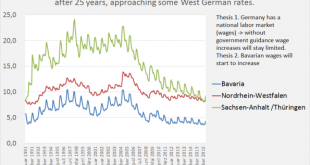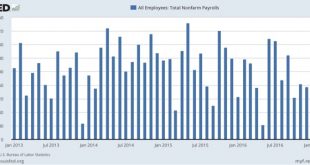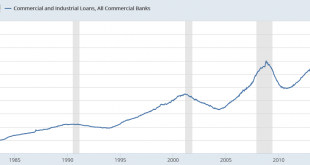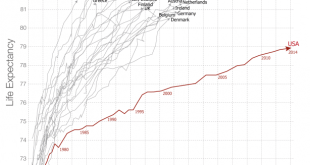Today: 2 graphs. And do I really have to write this blog? Yes, I have. At this moment the USA government seems to target bilateral trade balances: these should be more or less balanced. To quote a Trumptweet (January 27, 2017): “The U.S. has a 60 billion dollar trade deficit with Mexico. It has been a one-sided deal from the beginning of NAFTA with massive numbers…”. But it does not work that way. Bilateral trade deficits are not the right measure to estimate if trade is one-sided...
Read More »Some graphs 1. German unemployment
The coming days I will post some graphs. The first I made to answer the question if East German unemployment was finally coming down. East Germany has experienced sky-high unemployment for decades despite massive transfers and despite a wage level which is supposed to be 25% lower than in West Germany. But at this moment, East German über-unemployment has more or less disappeared, at least compared with the German version of the rust belt (Stainless steel belt? Nutzeisen belt?). Two...
Read More »Neoliberalism and mainstream economics
from Lars Syll Oxford professor Simon Wren-Lewis isn’t pleased with heterodox attacks on mainstream economics. One of the reasons is that he doesn’t share the heterodox view that mainstream economics and neoliberal ideas are highly linked. In a post on his blog, Wren-Lewis defends the mainstream economics establishment against critique waged against it by Phil Mirowski: Mirowski overestimates the extent to which neoliberal ideas have become “embedded in economic theory”, and...
Read More »What did you do?
NDd and I thought this one was “funny”. Not sure how to attribute:
Read More »A thought for Sunday: for now the economy remains on automatic pilot –and that’s good
by New Deal democrat A thought for Sunday: for now the economy remains on automatic pilot –and that’s good How much, if any, of the economy, has been influenced by the Trump/Ryan GOP government in Washington to date? With one exception, not much I think. First of all, while the jobs report was certainly good, was no better than the average report from 2014 or 2015 — or 4 of the last 8 months, for that matter: And it wasn’t just foreseeable, it was...
Read More »Credit check
Note how it’s all been decelerating since the collapse in oil capex, and most recently the deceleration hasintensified: This is the absolute level of loans outstanding, which seems to only go negative like this in recessionsThis is the annual growth rate which appears to be in a state of collapse: Note the pattern of accelerating into recession, then decelerating:
Read More »USA life expectancy vs. health expenditure 1970-2014 compared to other OECD nations
from David Ruccio It is likely, if some version of Trump/Ryancare is approved in the United States, millions more people will not be able to purchase the insurance necessary to receive adequate healthcare. The problem is, the United States is already an outlier when it comes to the relationship between health expenditures and health outcomes—measured in this case by life expectancy. As Esteban Ortiz-Ospina and Max Roser explain, all countries in this graph have followed an upward...
Read More »The Role of Experts in Public Debate
Jonathan Portes asks, “What’s the role of experts in the public debate?” He assumes it is his prerogative, as an expert, to define that role: I think we have three really important functions. First, to explain our basic concepts and most important insights in plain English. Famously, Paul Samuelson, the founder of modern macroeconomics, was asked whether economics told us anything that was true but not obvious. It took him a couple of years, but eventually...
Read More »Budget Topline
from Peter Radford We all ought calm down about the Trump budget. Presidential budgets never, ever, get put into practice. They are simply exercises in politics. They simply give us insight into presidential goals. In Trump’s case there is nothing that we didn’t already know. He wants to slash domestic programs, especially those niggling ones that offend his far right fans, and pile on the offensive weaponry for the Pentagon. As I said: no big surprise. Here’s a very short synopsis of the...
Read More » Heterodox
Heterodox







